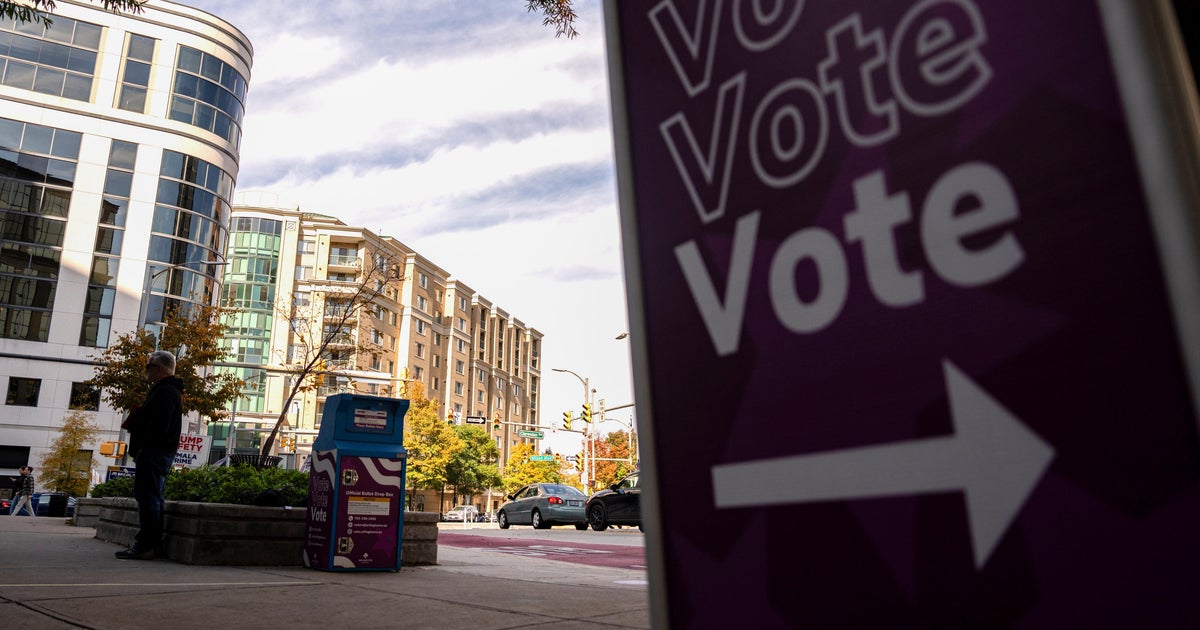
Washington — The Supreme Court on Wednesday allowed Virginia to move forward with its removal of roughly 1,600 alleged noncitizens from its voter rolls just days before the 2024 election.
The high court granted a request from state officials to pause a lower court order that blocked Virginia from continuing its systematic voter removal program that was launched in August, exactly 90 days before Election Day. A provision of the National Voter Registration Act requires states to complete programs aimed at purging ineligible voters from registration lists up to 90 days before federal elections.
Justices Sonia Sotomayor, Elena Kagan and Ketanji Brown Jackson said they would have denied the request from Virginia officials.
Virginia officials had asked the Supreme Court to grant its request for emergency relief by Tuesday. They claimed that the district court’s order violates Virginia law “and common sense,” and “mandates a variety of disruptive measures.”
The injunction issued by the lower court will harm “Virginia’s sovereignty, confuse her voters, overload her election machinery and administrators, and likely lead noncitizens to think they are permitted to vote, a criminal offense that will cancel the franchise of eligible voters,” state officials wrote.
Federal and Virginia law prohibits noncitizens from voting in federal elections.
Virginia’s bid for the Supreme Court’s intervention arose from a Justice Department lawsuit filed against the state earlier this month that targeted an executive order from Gov. Glenn Youngkin, a Republican. The order formalized a systematic program to remove from statewide voter registration lists people who were unable to verify that they are citizens to the Department of Motor Vehicles. State officials said the program was in place, and the order merely changed the frequency of the data reporting from monthly to daily.
The Justice Department argued that the implementation of the program violates the so-called Quiet Period Provision, a section of the National Voter Registration Act that bars states from implementing programs that seek to remove ineligible voters from their rolls by no later than 90 days before an election. Federal officials have said the quiet period aims to mitigate the risk that eligible voters will be mistakenly removed from voter rolls through automatic removal programs and ensure they have enough time to fix any errors.
Youngkin announced his state’s systematic program on Aug. 7, exactly 90 days before the Nov. 5 general election.
U.S. District Judge Patricia Giles granted the Justice Department’s request for a preliminary injunction Friday, ordering the state to restore the voter registrations of roughly 1,600 people who were purged from state rolls under Youngkin’s program. Giles found the state likely violated federal law when it systematically canceled those voters’ registrations during the so-called quiet period.
A panel of three judges on the U.S. Court of Appeals for the 4th Circuit upheld the district court’s order Sunday, saying in a brief order that it is “unpersuaded” by the argument from Virginia officials that the state’s program doesn’t violate the federal voter registration law.
The three-judge panel found state officials were wrong to assert that they were ordered to restore roughly 1,600 noncitizens to voter rolls, as they failed to establish that those removed under Youngkin’s program were actually noncitizens. It reiterated that some of the people whose voter registrations were canceled are eligible to cast ballots.
In their request to the Supreme Court, Virginia officials argued the Quiet Period Provision doesn’t apply to the removal of noncitizens from the state’s voter rolls, since they’re not eligible to vote at all. Still, they said that those who were identified as noncitizens and registered voters are informed that their registrations will be canceled and given 14 days to verify that they are citizens.
State officials argued in their filing that the Justice Department and voting rights groups asked the district court to “inject itself into the Commonwealth’s reasonable and longstanding election processes within a month of the election, and weeks after early voting had begun.”
They also refuted the characterization of its efforts to purge alleged noncitizens from its rolls, noting that Youngkin’s order did not create the state’s process, but rather increased the frequency of data-sharing among agencies from monthly to daily.
The district court’s injunction, state officials argued, would “impose significant cost, confusion, and hardship upon Virginia, creating a massive influx of work for its registrars in the critical week before the election, and likely confusing noncitizens into believing that they are eligible to vote.”
But the Justice Department said Virginia’s program falls squarely within the Quiet Period Provision and argued the district court’s order impacts “only a discrete set of identified voters.” It does not prevent Virginia officials from conducting individualized inquiries or taking other steps to ensure noncitizens aren’t voting in the general election, Solicitor General Elizabeth Prelogar wrote in a Supreme Court filing.
“[W]ithout injunctive relief to remedy [Virginia’s] violation of the Quiet Period Provision, eligible citizens will suffer unjustified burdens on their right to vote — potentially including disenfranchisement,” she said.
The Justice Department brought a similar suit against Alabama over its process for removing roughly 3,200 potential noncitizens from its voter registration list. Prosecutors said the state began its program on Aug. 13, 84 days before Election Day, and incorrectly deemed more than 2,000 eligible voters ineligible to vote.
A federal judge blocked Alabama earlier this month from continuing the program to remove ineligible voters from registration lists and stressed that the order does not restrict the secretary of state’s ability to remove noncitizens from Alabama’s voter rolls. She also ordered the state to restore eligibility to the deactivated voters.
